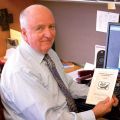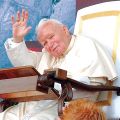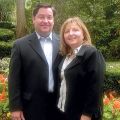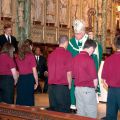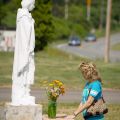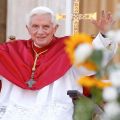Faith
An escape from city life led to an unexpected call to serve the Church
By Mike Girard, Catholic Register SpecialMAYO, YUKON TERRITORY - When we moved to the Yukon almost four years ago, it wasn’t to work in the missions. I was employed as a schoolteacher and my wife Tina stayed home with our young son Johnathan. We moved to Mayo for adventure, change and reprieve from city life. It was not meant to be a long-termcommitment, nor working for the Church.
The village of Mayo has a population of a little more than 400 people, predominantly the Na Cho Nyak Dun First Nation. Although we did not move to the Yukon to work in the missions, it seems God had other plans.
Sr. Angela Shea of the Sisters of Notre Dame was resident administrator for Christ the King mission. She had been here almost 20 years where she led the Catholic community and was an integral part of the larger community. During our first year, there was talk of the 80-year-old sister leaving Mayo and retiring to her native Prince Edward Island. In talking with Whitehorse Bishop Gary Gordon, Tina and I expressed ourwillingness to serve the Church. With Sr. Angela leaving, the timing was good. Gordon asked if we would fill in as mission administrators. His need for missionworkers and our interest and desire to serve the Church came together, and we began discussing the transition, which took place in 2009.
There are about 47 Catholics in Mayo. Besides keeping the lights and heat on in the church and rectory, we help keep the Catholic faith alive in the small community. We arrange for the priest in Dawson to come twice a month for Mass and other sacraments, and I lead the community in a Communion service on Sundays when he is not present. We usually meet for coffee and goodies or a meal after to catch up on news and share a laugh. We say the rosary with others and have Stations of the Cross during Lent. Each day, we strive to be a living witness to the Catholic faith and administer to the spiritual and other needs of Catholics. We call Fr. Ernest Emeka Emeodi from Dawson or Gordon when assistance or adviceis required.
Many joys and challenges of lay ministry abound in this remote part of Canada. Mayo is located near 63 degrees latitude, halfway between Whitehorse and the Arctic Circle. Mayo holds the distinction of being both the hottest and the coldest community in the Yukon. It is not uncommon for temperatures to dip to minus 50 Celsius for some days, and for a cold spell of minus 40 or more for a week.
While there are both joys and challenges, the joys definitely outweigh the latter. Some joys include living in the rectory which is attached to the church and having the Blessed Sacrament available 24 hours a day. There is joy knowing that although at times we feel we have a small role, it is nonetheless vital for the Catholic faith and Church locally. There is a deep inner joy knowing we are in the service of God and His work.
Since starting in Mayo, Tina and I have moved on but continue our mission work with the Church. We recently moved to Yellowknife, N.W.T., where we are ministering at Trapper’s Lake Spirituality Centre.I pray that more lay people — single and families — will be open to working for the Church in the missions for a time, be it a year or two or more. Perhaps an interest and desire might be awakened and one may hear a call. As a lay couple and family, it is not for everyone, but it has certainly been rewarding and a real blessing for us, not to mention the great adventure.
Toronto’s Year of Faith focused on faith formation
By Vanessa Santilli-Raimondo, The Catholic RegisterTORONTO - To celebrate the Year of Faith, the archdiocese of Toronto’s office of formation for discipleship has undertaken its most focused effort at faith formation to date.
“This is an opportunity in this year for people to pause and to consider the role of faith in our own lives and why we are eager to share that faith with other people,” said Bill Targett, director of the office of formation for discipleship.
Targett said the archdiocese will be offering 18 programs across the archdiocese for the Year of Faith, which kicked off Oct. 11, alongside the 50th anniversary of the opening of Second Vatican Council and the 20th anniversary of the promulgation of the Catechism of the Catholic Church, and ends Nov. 24, 2013, on the feast of Christ the King.
“They range from single night workshops to look at one topic up to and including an eight-part series,” said Targett. “And then, in between those extremes, there’s a whole variety of other workshops.”
Topics vary from Catholic social teaching and basic teachings of the Catholic Church to lectio divina and prayer. Free of charge, the hosting parishes will become “regional centres of formation,” said Targett.
There will be three rotations of the same workshops in the fall, winter and spring at different locations to geographically accommodate as many people as possible, he added.
“The Year of Faith has been a long time coming,” said Targett. “John Paul II was speaking about it already in the early ’90s and for us, it’s exciting that it’s finally here. And we look forward to contributing whatever we can to helping to replant the Gospel in the West.”
Targett said he regards parishioners as the “frontline of people.”
“If we can help convince them of the important role that faith has in their lives, I think they’re the best example to spread that information through a wider community so that people who are not of faith look at a Catholic and say, ‘What is it about that person that makes them happy as they are?’”
For the younger crowd, the archdiocese of Toronto’s Office of Catholic Youth will be running catechetical events based on the Compendium of the Social Doctrine of the Church and YOUCAT: The Youth Catechism of the Catholic Church.
A solemn opening Mass to launch the Year of Faith will be celebrated by Cardinal Thomas Collins Oct. 14 at St. Paul’s Basilica in Toronto. In addition, Collins will be dedicating this year’s lectio divina programs to a biblical understanding of faith.
For more information on the office of formation for discipleship’s Year of Faith workshops, see www.archtoronto.org/discipleship.
What is the new evangelization?
By Catholic Register StaffSince the late Pope John Paul II coined the phrase in an address to Latin American bishops in the late 1970s, Catholic thinkers, writers, theologians and pastors have debated what the new evangelization really means. In the lineamenta sent to more than 200 bishops earlier this year in advance of the synod, Archbishop Nikola Eterovic offers several definitions. Among them:
o The new evangelization is primarily addressed to those who have drifted from the Church in traditionally Christian countries.
o There should also be a dialogue with those to whom religion is something foreign.
o The new evangelization is primarily a spiritual activity to recapture the courage and forcefullness of the first Christians and first missionaries.
o As an evangelizer, the Church begins by evangelizing herself.
o Evangelization is facing new challenges which are putting accepted practices in question and are weakening customary, well-established ways of doing things.
o The Church does not give up or retreat into herself; instead, she undertakes a project to revitalize herself.
o The new evangelization is a frame of mind, a courageous manner of acting.
o A new evangelization means, then, to work in our local churches to devise a plan... to transmit the Gospel of hope in a practical way.... becoming more and more the artisan of the civilization of love.
o A new evangelization also means to have the boldness to raise the question of God in the context of these problems.
o In the end, the expression new evangelization requires finding new approaches to evangelization so as to be Church in today’s ever-changing social and cultural situations.
Marriage Encounter strengthens the relationship
By Evan Boudreau, The Catholic RegisterTORONTO - It’s one thing to have a good marriage, it’s another thing to have a great one, and that’s what a Marriage Encounter weekend can offer.
“You really are disconnected from the world for a weekend and investing in your relationship,” said David Adams, co-county co-ordinator for the English Toronto district of Worldwide Marriage Encounter with his wife, Lucy. “Really the basis of the weekend is to help couples learn a communication technique called dialoguing.”
This is done by essentially sequestering a group of couples, in the case of the upcoming Nov. 2-4 weekend at Mississauga’s Four Points Sheraton, and having them discuss specific topics with their significant others.
Each topic is first discussed in front of the group of participating couples by one of the presenting couples who have already completed the regular week and a more intensive training version. These presentations last between 30 and 40 minutes.
Twelve topics of discussion are presented during the weekend after which all participants privately reflect on their personal feelings regarding the topic. These reflections are then shared with the respective spouses.
“It’s more than just the topic, it’s about being able to listen, to get the feelings behind the topic,” said David Adams.
“It’s really about understanding who you each are.”
Topics include defining the type of listener you are, determining the personality of your partner and sex.
“Each topic follows each other so beautifully and by the time you get to the end, which is the sacrament, it’s like this yearning to really almost make that new commitment to each other, that bigger commitment,” said Lucy Adams. “It just gives (couples) a whole program to experience other couples openly sharing their lives and vulnerabilities.”
But it doesn’t end on the Sunday. The group is encouraged to establish a sharing circle.
According to Lucy Adams, about 80 per cent of couples successfully establish these groups with a small percentage of those who do not returning for a second weekend.
These groups meet monthly and practice the dialogue technique. This strengthens the ability to communicate and in turn the marriage.
“It allows couples that were together, in a very condensed and simplified format, to continue that weekend,” said David Adams. “We’d like to see couples continue to be connected with the Worldwide Marriage Encounter community and keep it alive in their marriage.”
Worldwide Marriage Encounter, the facilitating organization of the weekends, began in Spain with Fr. Gabriel Calvo in 1961. By the end of 1967 Marriage Encounter weekends had begun in North America starting in New York. Worldwide Marriage Encounter is active in more than 90 countries, in a variety of languages and focus on different faiths, but all have a consistent format.
“There might be some regional subtleties but the whole format and the desire behind it are consistent,” said David Adams.
Although the weekends co-ordinated by the Adams are Roman Catholic based, inter-faith couples are still encouraged to come — David Adams was an Anglican when he attended in the spring of 1995 but has since converted to the Catholic faith.
For those interested in the November weekend, or one scheduled for April 19-21, call Cora or Mike Bryce at (905) 896-2958.
First NET team established in Quebec
By Carolyn Girard, The Catholic RegisterOTTAWA - After 18 years of evangelizing youth across Canada, National Evangelization Teams (NET) Ministries has finally taken hold in Quebec.
Seven youth aged 18-20 will devote the next eight months of their lives to missionary work at Saint-Louis-de-France parish in Terrebonne, Que. There, they hope to bond with parishioners, who will billet them in their own homes, and lay the foundations for an active youth ministry while sharing the Good News and drawing people into a personal relationship with Christ.
“It is an amazing opportunity to be in Quebec and it is certainly missionary territory,” said Joe Vogel, executive director for NET.
NET Ministries already has several English-speaking youth missionary teams across Canada. Vogel explained that “Les equipes NET,” the French-speaking branch of NET, began several years ago as a travelling team which spent one to two weeks in various francophone communities. He likens the visits to planting a “seed” of faith, but in Terrebonne that seed will now be watered and given ample sunshine. The parish team will spend almost a year getting to know the community and its social reality, forming friendships, identifying the needs and wants of the faithful. It aims to organize a youth group, retreats, prayer events, anything to be effective in reaching people’s hearts for Christ. Essentially, the team is there to serve, responding wholeheartedly to the call for new evangelization, after a summer of training.
“We’re praying that it works and we are going to do the best that we can,” said Vogel. “Success would be witnessing the Gospel to young people and seeing lives changed.”
The community at Saint-Louisde-France was eagerly anticipating the NET team’s arrival this month. Micheline Chartrand, a lifetime parishioner, made the trip from Terrebonne to Ottawa on Sept. 29 for the NET Ministries’ Commissioning Mass, where Ottawa Archbishop Terrence Prendergast gave his blessing to all the young missionaries who will scatter across Canada this year.
“My hope is that by the end, we will have a group of youth who will be equipped to train other youth (to evangelize) and that they will experience peace and serenity in their hearts,” said Chartrand, adding that the French travelling team helped revive her faith during its visit more than a year ago.
None of the team members come from Quebec, but all are eager to explore the new mission territory and brush up on language skills at the same time.
“It’s a little intimidating, and humbling, but very exciting,” admits Kaylene McQuaid, originally from North Battleford, Sask. “I took French from Kindergarten until Grade 12, but I kind of took it for granted, and now I see there was definitely a reason why I took French. But being immersed in the culture will help as well.”
Charles Turner, a team member from Alberta, is honoured to live out the new evangelization in uncharted territory.
“We’re really coming out of our comfort zone,” he said.
In addition to Quebeckers, the NET missionaries will also be working directly with five missionary priests from France, members of the Community of Saint John, which was founded in 1975. The religious community of brothers began sending its priests to Quebec 16 years ago.
Fr. Marie Elie joined his brethren in Canada five years ago, with the task of finding the means to breathe life into the faith lives of the youth. Little by little, the priests have been creating opportunities for the youth of their parish to grow in faith and are preparing to send a group to the next World Youth Day. But NET seemed like the answer to their prayers, to give their ministry a boost.
“It is a beautiful opportunity to have young people who are equipped to encounter and engage young Quebeckers. The culture is a difficult one to penetrate, and a difficult one to connect with, and so we know that to succeed in the task we need help to show young Quebeckers that faith is not dead and the Gospel can be a beautiful part of their lives,” said Fr. Marie Elie.
NET missionary Pio Hartnett joins the Quebec team directly from Ireland. This year’s stay in Terrebonne will offer many challenges, but he still feels confident.
“The situation in Quebec reminds me of the situation in Ireland,” said Hartnett. “When I signed up for NET, I thought it would be amazing to be a part of this team... and so I am very excited.”
Crowds flock to New Jersey tree with a scar some claim resembles Mary
By Catherine McDonough, Catholic News ServiceWASHINGTON - A scar on a tree on a West New York, N.J., street that some claim looks like Our Lady of Guadalupe is "a natural occurrence," said Jim Goodness, a spokesman for the Newark Archdiocese.
But he told Catholic News Service he hopes the devotion it has prompted might lead people to think more deeply about their faith. Crowds began to form at the site July 14.
News reports indicated that hundreds of people have come to the site, now dubbed the "Virgin Mary tree." Located on the corner of 60th Street and Bergenline Avenue, the tree has been taped off and is under watch by city police and volunteers.
Kateri feast day draws Native American Catholics eager for own saint
By Chaz Muth, Catholic News ServiceFONDA, N.Y. - With the beat of a drum sounding and the scent of burning sage and sweet grass permeating the hot, humid air, Native American Catholics honored a woman they already consider a saint July 14, her feast day.
This year's celebration was special, because in October the Algonquin-Mohawk woman who died more than 400 years ago will at long last become a saint.
Church must preach truth, justice, Pope says at Mass in Frascati
By Catholic News ServiceFRASCATI, Italy - Christians don't preach what the powerful want to hear or what will please a crowd; "their criteria is truth and justice," even if it garners no applause, Pope Benedict XVI said during an outdoor Mass.
The Pope celebrated Mass July 15 outside the Cathedral of St. Peter the Apostle in Frascati, about five miles from his summer villa at Castel Gandolfo.
Bishop Raffaello Martinelli of Frascati had worked with the Pope at the Congregation for the Doctrine of the Faith, specializing in catechesis. Pope Benedict told the estimated 8,000 people gathered in the square outside the cathedral that the bishop's "voice is very much present" in the text of the Catechism of the Catholic Church.
'Blessed are the peacemakers' is theme of 2013 World Peace Day
By Catholic News ServiceVATICAN CITY - Threats to religious liberty and other basic rights, the global financial crisis and crises in politics and education signal a "worrying crisis of democracy," said a note from the Vatican announcing Pope Benedict XVI's choice of a theme for World Peace Day 2013.
In a message reflecting on the theme, "Blessed are the peacemakers," the Pope will offer "an ethical reflection" on measures that the global community is considering or should adopt in response to the various crises afflicting many countries around the world, said a Vatican communique published July 16.
No peace without dialogue, sacrifice, patience, Pope says
By Catholic News ServiceCASTEL GANDOLFO, Italy - Just as individual musicians in an orchestra turn dissonance into harmony through hard work, sacrifice and listening to one another, so, too, can the world's people turn conflict into peace, said Pope Benedict XVI.
The pope made his remarks following a July 11 concert performed in his honor by young musicians from Israel, the Palestinian territories and other Arab countries.
Mission work requires Gospel joy, living God's love, Pope says
By Carol Glatz, Catholic News ServiceVATICAN CITY - Bringing God's word to mission lands is successful only when missionaries live the Gospel with joy and share the love and goodness they receive from God, Pope Benedict XVI said.
"What is good has the inherent need to be conveyed, to give itself; it cannot stay closed up in itself (because) something good and goodness itself are essentially 'communicatio,'" that is, sharing with others, he said during a brief visit to a center belonging to the missionaries of the Society of the Divine Word.



